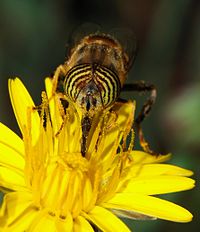
Photo from wikipedia
Natural or biological insect pollinators (such as honeybees, native bees, moths and butterflies, some species of beetles and flies) constitute an important and integral part of our diverse natural ecosystems… Click to show full abstract
Natural or biological insect pollinators (such as honeybees, native bees, moths and butterflies, some species of beetles and flies) constitute an important and integral part of our diverse natural ecosystems across the planet. However, the farmer friendly, natural insect pollinators or in other words, biological pollinating agents, are being very seriously and negatively impacted by a number of factors such as environmental pollution, different parasitic diseases, changes in our land use patterns and agronomic practices over the past decades. Coupled with lack of suitable melliferous flora, as appropriate food and foraging resources, malnutrition and ecological stress (to mention only a handful), pollinators need our help. Among all the pollinator insects, bees; particularly the native (indigenous bee) as well as the honeybee, have been worst impacted. Hence, it is absolutely important to develop comprehensive, long term, sustainable, environmentally friendly conservation strategies to protect different species of insect pollinators. Establishing bee or pollinator sanctuaries (pollinator gardens or pollinator habitats) at strategic, ecologically suitable, undisturbed areas across different agro-climatic zones by planting suitable and locally adapted pollinator mixes of wildflowers, annual/perennial legumes and native and/or forage grasses could serve as an important starting point. Such pollinator habitats, gardens or sanctuaries will not only cater for successful pollinator (bee) conservation, but can also serve to enrich local biodiversity by developing into low cost and low maintenance, naturally sustainable, ecological units. Pollinators are important natural or biological agents that perform the task of cross pollination in higher plants (angiosperms) successfully. Different pollinators have evolved over time and are either generalist or specialist in nature; suggesting that some will visit a wide diversity of plants for securing pollination, while others are highly specific in their host plant choice. When we talk about pollinators, we mostly think about insect pollinators like bees (native bees, honeybees) (see Figure 1), moths and butterflies (see Figure 2) and some species of beetles and flies (see Figure 3). However, natural cross pollination in the natural world is not just successfully conducted by insects, but by several other animals such as some species of snails and slugs, some birds such as humming birds and mammals like bats. Researchers are currently working on several high canopy resident reptiles and amphibians from tropical and subtropical ecosystems that are also believed to play important role in cross pollination for some special plants with unique adaptations. Pollinators have coevolved along with their host plants for several millions of years; and have developed spectacular adaptations that make them highly efficient agents of natural cross pollination. It is however, important to note that cross pollination in some other plants is also achieved by non-biological agents like air and water too. Explosive growth of human populations across the planet together with rapid industrialisation and urbanisation; and the practice of non-sustainable extensive and intensive agriculture have been impacting natural ecosystems and the environment negatively. As a consequence, different pollinators have been impacted at various scales due to a number of anthropogenic factors; but the worst hit being bees and other insect pollinators. Environment pollution, drastic changes in the land use patterns, parasitic diseases, lack of proper foraging plants for nutrition, extinction of some pollinator friendly plants in natural ecosystems have been putting heavy pressure on different species of insect pollinators, especially bees. Rapid population crashes of these helpless environmentally friendly natural pollinating agents like bees may have significant negative impacts on our global crop and honey production in the future. Several crops, including food and commercial crops, are dependent on natural insect pollinators like bees for achieving
Journal Title: Biodiversity
Year Published: 2018
Link to full text (if available)
Share on Social Media: Sign Up to like & get
recommendations!